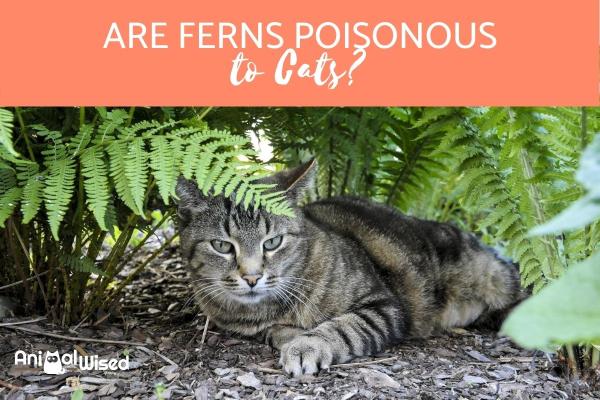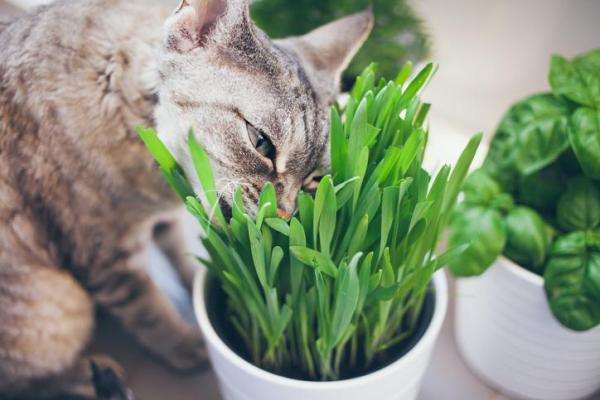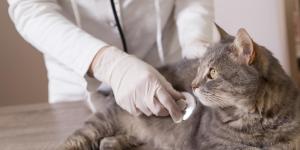Are Ferns Poisonous to Cats?



See files for Cats
Cats are not only curious, but they explore their environment in particular ways. Using their mouth is as important as using their paws, nose or eyes. Unfortunately, many of the plants we might think of as being perfectly safe, contain chemicals which are toxic to plants. Others are perfectly fine for them to ingest. Some common houseplants are known as ferns, many of which can be found both indoors and outdoors.
In this AnimalWised article we ask are ferns poisonous to cats? We reveal the risks involved in keeping ferns with cats and also discuss other toxic plants we need to avoid.
Why do cats eat house plants?
Cats are obligate carnivores and require protein of animal origin to survive. They can eat other types of food, but not many will provide much in terms of nutrition. We do know that cats will sometimes eat plants, but it is not completely clear why they do so.
Although cats will eat certain types of grass, it should not provide much in terms of nutrition. The reason they eat it is believed to be as a digestive aid. By eating grass, they may be able to help facilitate intestinal transit as it can physically unblock their digestive tract. This is mainly in the form of vomiting. It is one of the reasons a cat vomits, but it is important to note there are many others.
However, this doesn't necessarily mean the cat is allergic to the specific plant it has ingested. The physical process of eating the fibrous grass can be the cause of retching and vomiting. When the cat eats a toxic plant, it could result in vomiting, but it can cause other serious problems if poisoning occurs.
When a cat eats a poisonous substance, their reaction will depend on different factors. These include:
- Toxicity of the substance
- Form of contamination (eg. ingestion, physical touching, inhalation)
- How much has been ingested
- Health of the cat
- Sensitivity/allergies to the substance
- If the substance has been regurgitated
If a cat does ingest poisonous plants, the symptoms range from mild to acute. Plants can be toxic to cats in different ways. While ingesting the plant can cause poisoning, some plants can cause problems when the cat simply touches them. The pollen of certain plants is also poisonous if inhaled. Symptoms of poisoning in cats include:
- Vomiting
- Diarrhea
- Excessive salivation
- Coughing
- Skin irritation
- Convulsions or spasms
- Depression
- Dilated pupils
- Respiratory problems
- Weakness
- Ataxia (poor limb coordination)
- Frequent urination
- Unconsciousness
- Toxic shock
- Death
If a cat is weakened by an underlying health condition which reduces their immune system's effectiveness, they may be worse effected by eating toxic plants. In these cases, they are not able to respond as effectively as a healthy cat and their health is seriously threatened. These conditions include feline AIDS and feline panleukopenia caused by the parvovirus in cats.
Are ferns toxic to cats?
The problem with asking whether ferns are poisonous to cats is that it is difficult to define what is and isn't a fern. Many plants have various names, including their Latin taxonomic name and various colloquial reference names. Some of these are true ferns and others are not.
True ferns are a group of plants with a vascular system (the xylem and phloem which transport nutrients up and down the stalk). They do not have seeds or flowers, but germinate new plants thanks to spores. They have characteristic leaves, known as fronds. They look complex and beautiful, one of the main reasons they are popular in homes.
Most true ferns are not poisonous to cats. They will still likely induce vomiting when ingested and can lead to an upset stomach. However, they are not considered toxic. These types of fern safe for cats include:
- Maidenhair fern
- Boston fern
- Staghorn fern
- Rabbit's foot fern
- Button fern
One of the most popular fern plants we can find in homes and gardens is known as common bracken or the eagle fern (Pteridium aquilinum). This plant is toxic to cats. While it won't cause harm when it comea in contact with a cat's skin, it is toxic when ingested. This is thanks to a compound known as ptakilosid. This is considered the main chemical responsible for the appearance of health problems in animals that have ingested the fern[1].
Strangely, the compound can be addictive to the cat. Even after experiencing adverse effects, the cat might want to eat more. Not every cat is the same, however. Some may only eat a little and never eat it again. Others may eat it compulsively and cause serious health problems.
There are many different types of fern which are not toxic to cats. There are also plants which are referred to as ferns, even if they are not true ferns (i.e. those in the Polypodiopsida class). This is why we provide a full list of all ferns which are toxic to cats, even if they are not true ferns.
If you want to find suitable plants to keep in a home with a cat, you can find a list of safe plants for cats here.

Fern plants toxic to cats
As stated above, some of the ferns on this list are not actually ferns. However, they sometimes have a name which uses the word fern. The scientific names are followed by their common names shown in brackets. The ferns which are poisonous to cats are:
- Asparagus aethiopicus (asparagus fern)
- Cycad (fern palm)
- Asparagus densiflorus (foxtail fern)
- Asparagus densiflorus cv sprengeri (lace fern, racemose fern, plumosa fern, emerald fern)
- Conium maculatum (hemlock fern)
These plants should not be kept in a home with cats. We should also be careful if we have them outside and there are cats in the neighborhood as they may try to ingest them also.
My cat ate fern - what do I do?
If your kitten ate fern, you need to be aware of the symptoms. First of all, do not panic. You may cause your cat to be stressed, even if there is no real danger to the cat. You may even worsen the intoxication effects, depending on how you react. We should not do any procedures if we do not have any experience or expertise. We also should not medicate them ourselves.
When no serious symptoms are observed, it is possible the cat is not having a serious reaction. We should try to find out how much has been ingested and whether or not they have any concurrent symptoms. It is possible the cat may simply vomit and will not have any other adverse effects.
However, if we see the cat becoming drowsy, losing consciousness or any of the more severe symptoms of intoxication, it is vital we take them to the veterinarian right away. They may carry out a stomach pump, replace fluids or even provide medication if necessary. A severe reaction may require them to be monitored in a veterinary hospital.
Some guardians suggest giving milk if the cat eats a toxic plant. While this may not cause harm, in some cases it can quicken the absorption of the toxic compound, so it is best to not do this.
What are the risks of keeping ferns with cats?
Some readers may think they have had ferns in their household with cats and never experienced a problem. This is because not all cats will manifest a problem. They may not be interested in eating the plant at all. However, not all cats are the same. Some are more curious than others.
If you have had a cat in a home with ferns for a long time and not experienced any issues, it is possible there won't be any. This does not mean that the cat will not eat toxic ferns in the future. There is still a risk and you will reduce this to nil if you remove the toxic ferns.
When you bring a new cat into the home, be aware they may be more inquisitive than other cats. In general, even if the cat eats a fern which is toxic to them, they will likely have to eat a lot for it to cause a serious problem. If they are in fragile health due to other veterinary problems, the risks are higher. You will need to bear this in mind if you want to keep the plant in the home.

This article is purely informative. AnimalWised does not have the authority to prescribe any veterinary treatment or create a diagnosis. We invite you to take your pet to the veterinarian if they are suffering from any condition or pain.
If you want to read similar articles to Are Ferns Poisonous to Cats?, we recommend you visit our Prevention category.
1. Cruz, G., & Bracarense, A. P. (2004). Toxicidade da samambaia (Pteridium aquilinum (L.) Kuhn) para a saúde animal e humana. Semina:Ciências Agrárias, 25(3), 249.
https://www.researchgate.net/publication/280725904_Toxicidade_da_samambaia_Pteridium_aquilinum_L_Kuhn_para_a_saude_animal_e_humana
- ASPCA. (n.d.) Toxic and Non-Toxic Plant List - Cats. .
https://www.aspca.org/pet-care/animal-poison-control/cats-plant-list - Encyclopedia Britannica. (2015). List of Ferns.
https://www.britannica.com/topic/list-of-ferns-2075813






